By Special Request: Auxiliary Battery Installation w/pics
Posted: Wed Feb 06, 2008 1:45 pm
Before I went forward with this project, I searched the heck out of the old AS site and, other forums and got a zillion different opinions. I went with a simple, non electronic solution.
Here is a short write up and pics of the installation of my auxiliary AGM Deep Cycle Marine Battery and isolator switch. Why we didn't document this for the site while we were doing the install is beyond me...
About The Battery:
12V AGM, Group 24, 79Ah, 10.9"L x 6.8"W x 9.9"H, 53lbs
Around $200.00 US
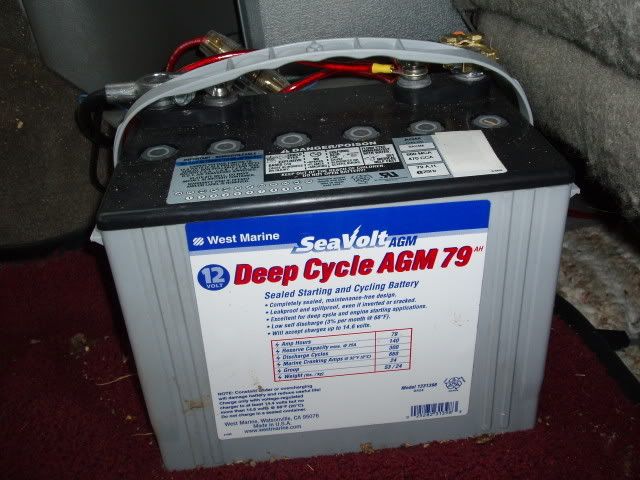
The AGM Deep Cycle battery from West Marine is an "Absorbed Glass Mat" battery.
AGM batteries have several advantages over both gelled and flooded, at about the same cost as gelled:
Since all the electrolyte (acid) is contained in the glass mats, they cannot spill, even if broken. This also means that since they are non-hazardous, the shipping costs are lower. In addition, since there is no liquid to freeze and expand, they are practically immune from freezing damage.
Nearly all AGM batteries are "recombinant" - what that means is that the Oxygen and Hydrogen recombine INSIDE the battery. These use gas phase transfer of oxygen to the negative plates to recombine them back into water while charging and prevent the loss of water through electrolysis. The recombining is typically 99+% efficient, so almost no water is lost.
The charging voltages are the same as for any standard battery - no need for any special adjustments or problems with incompatible chargers or charge controls. And, since the internal resistance is extremely low, there is almost no heating of the battery even under heavy charge and discharge currents. Most AGM batteries have no charge or discharge current limits.
AGM's have a very low self-discharge - from 1% to 3% per month is usual. This means that they can sit in storage for much longer periods without charging than standard batteries.
AGM's do not have any liquid to spill, and even under severe overcharge conditions hydrogen emission is far below the 4% max specified for aircraft and enclosed spaces. The plates in AGM's are tightly packed and rigidly mounted, and will withstand shock and vibration better than any standard battery.
More info here:
http://www.westmarine.com/webapp/wcs/st ... assNum=208
About The Switch:
Around $40.00 US
Make-before-break contact design allows switching between battery banks without power interruption.
Ignition protected - Safe for installation aboard gasoline powered boats
Case design allows surface or rear panel mounting
Meets American Boat and Yacht Council (ABYC) requirements for battery switches
"Blue Sea Systems' switch (9001e) is our choice for best value in a standard-duty battery selector switch. It's made in the U.S. with high grade materials, comes with a lifetime warranty, and is the least expensive switch in our test." - Powerboats Reports, June 2005
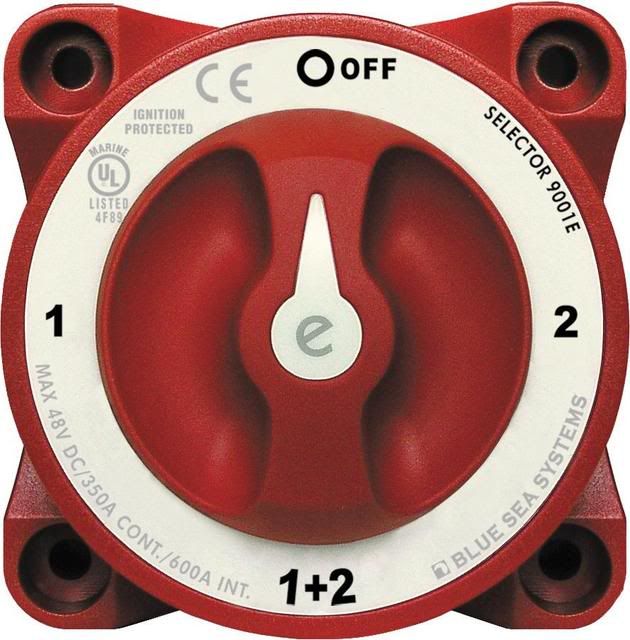
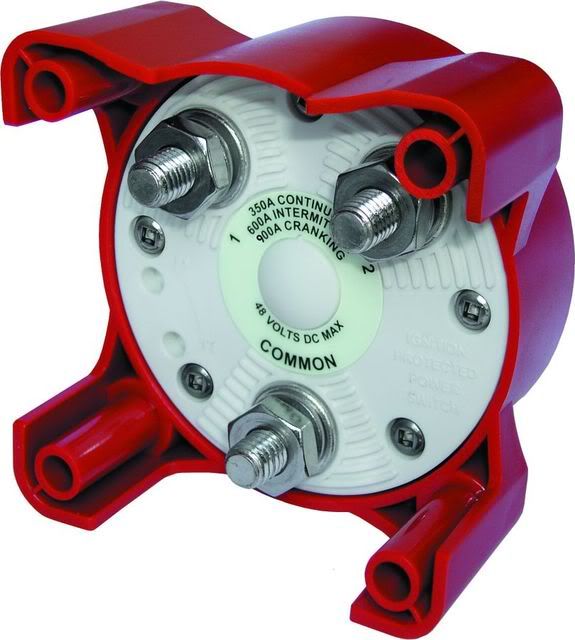
More Info here:
http://bluesea.com/category/1/products/9001e
Connecting The Switch
1st thing we did was disconnect both the positive (+) and negative (-) post from the vans battery.
Using the existing positive cable, we removed the protective rubber boot and connected this to the "common" terminal on the switch. [see back of switch]
Next we took a standard 6 inch side post battery cable (purchased from Advanced Auto for about $6.00) and connected this to the "1" terminal on the switch using a ring/crimp connector on the end of the side post cable. Then we connected the side post cable to the (+) Positive terminal on the stock battery.
Next we used a ring/crimp connector and connected the auxiliary battery cable to the "2" connector of the switch. [see back of switch]
We used tie wraps and secured the switch to the existing conduit. It is very secure, and very easy to remove if you need to.
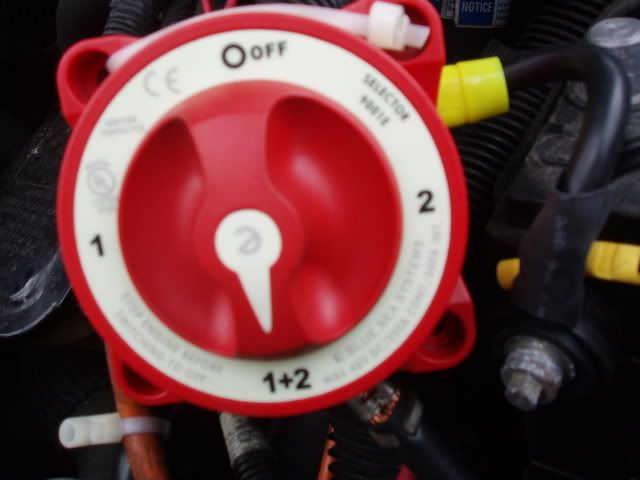
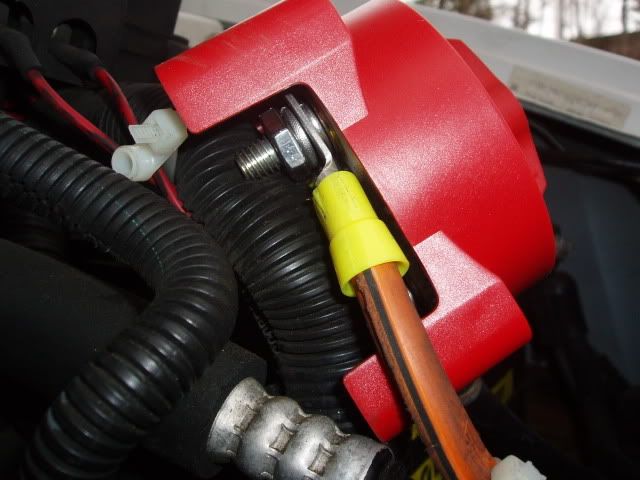
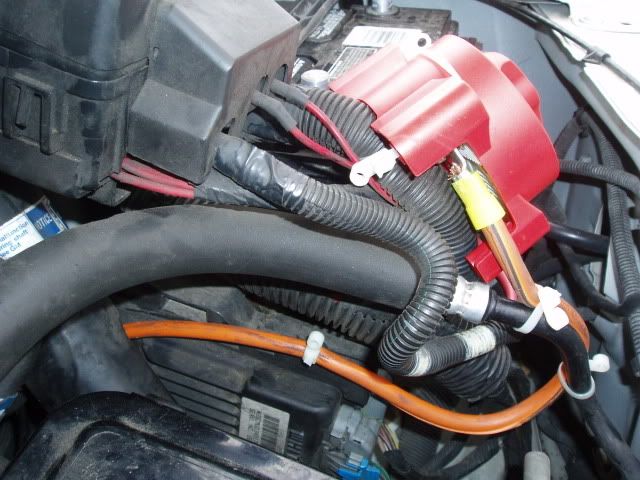
The battery currently is placed behind the 1st row rear seat.
I bought a top post battery cable, 24", and used the seat belt mounting bolt for the ground. [see pic below]
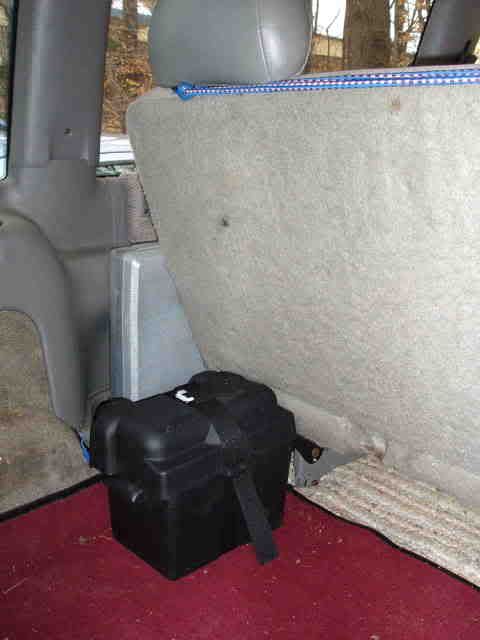
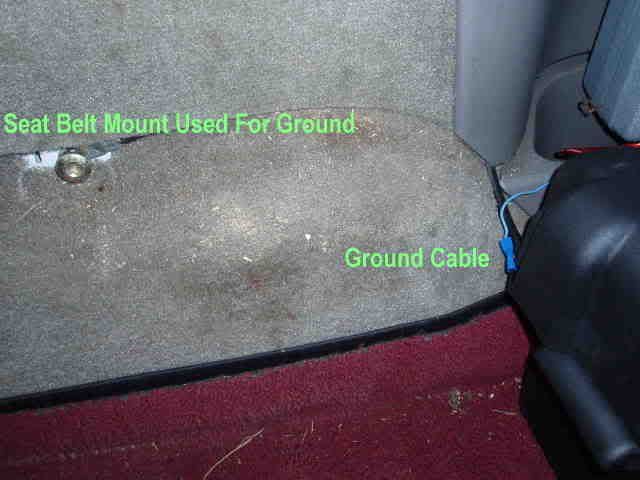
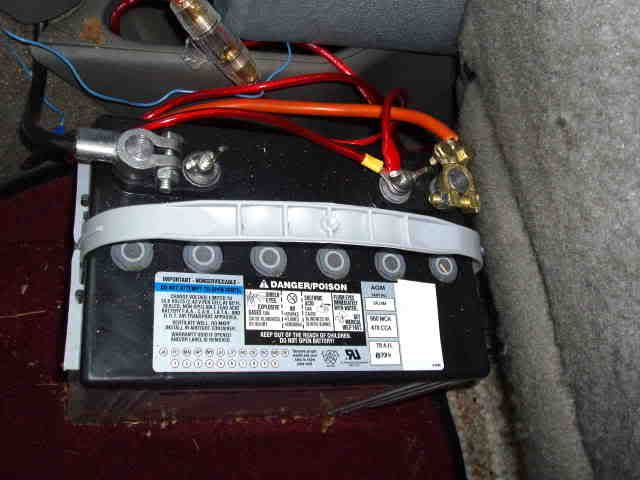
We ran a 6 gauge cable through the firewall close to the steering column.
The cable is from a 16 foot jumper cable that we split and removed the clamps.
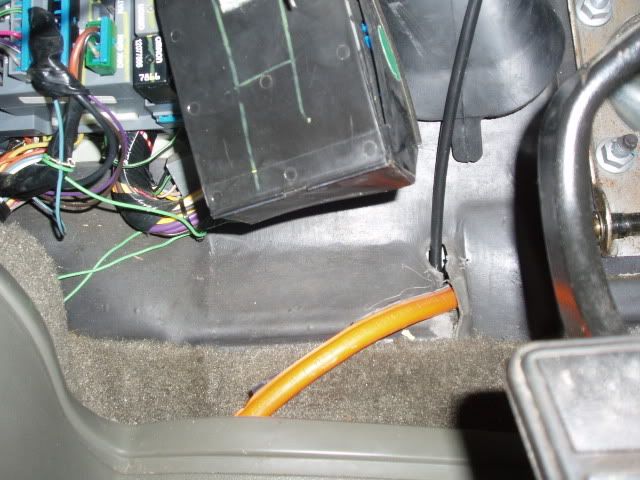
When we were finished, I flipped the switch to "2" and started the van using the Aux Battery. Not what I would usually do, just wanted to test it. Switched it back and fourth a few times and everything seems fine. Let it run a while, turned off the ignition, flipped the switch to both "1" and "2" and she fired right up.
I have only been on one road trip so far and the battery has powered my stereo for 8 hours at a time with no issues. To save power I disconnect two of the three amplifiers and run my external speakers.
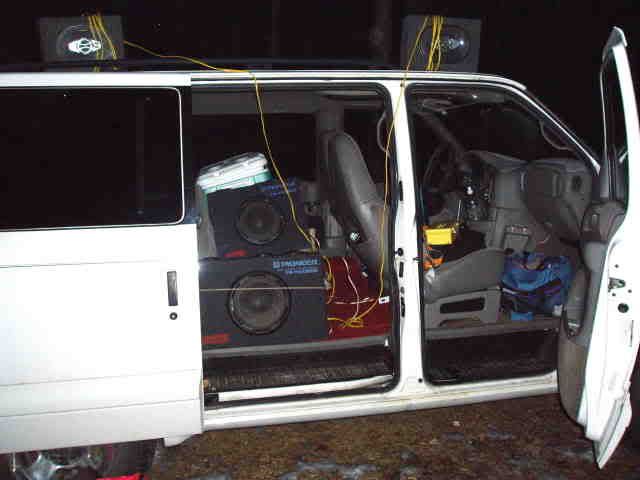
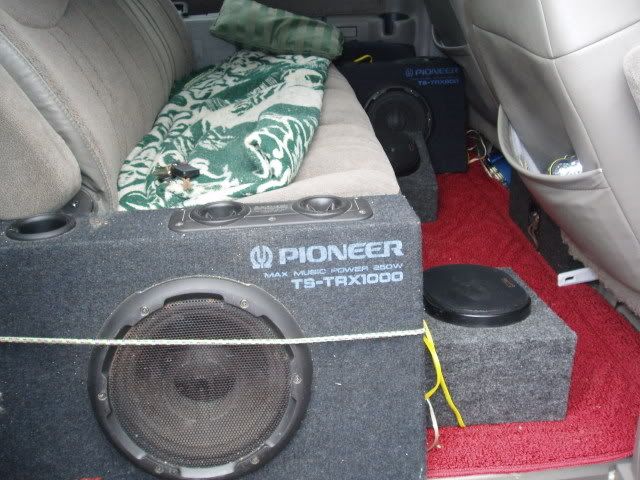
I use the switch set on "1" + "2", [both batteries in parralel] full time. This way the battery is being charged as needed using the vehicles charging system.
I switch to battery "2" [Aux battery]for when I am running the stereo with the engine off.
The next morning, or after an evening of partying, I turn the switch to "1" [car battery] for starting the engine. After a minute or two, with the engine running, I turn the switch back to "1" + "2" and let the battery recharge.
Of all the deep cycle batteries out there it appears the AGM is best suited for my needs. It can be used inside the vhicle. It can be used as a starting battery and a deep cycle battery and the vehicles charging system will work OK. However, if you run this battery down stone dead, an external charger is recommended to save your alternator.
I hooked up my 3 amplifiers directly to the Aux Battery. The CD player is hooked up normally. As most of you guys may know, a battery is like a big ass capacitor, and hooking an amplifier directly to the Aux battery is an ideal set up. I have a 15" subwoofer between the seats, and this new setup really provides the power when it's needed.

I don't yet have the battery fused. Haven't quite figured out what I should use. Any suggestions?
Here's a couple of pics of the stereo and sub.
The armrests had to come off to squeeze the sub enclosure between the seats.
It is actually more comfortable setting the armrests on the sub.
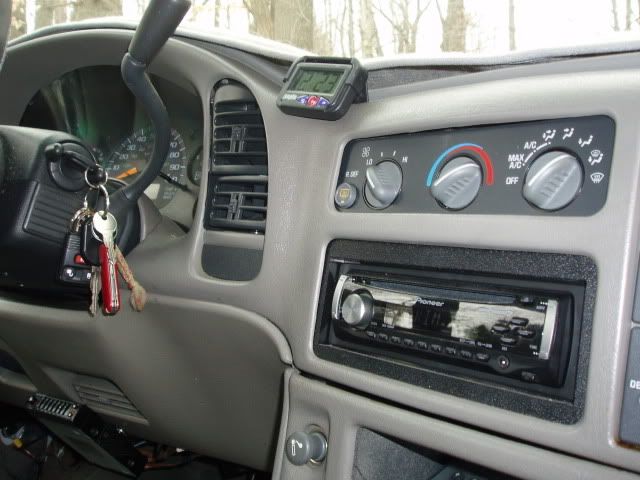
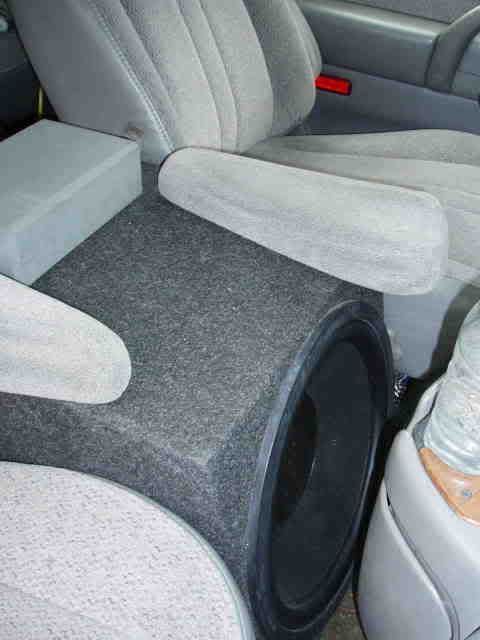
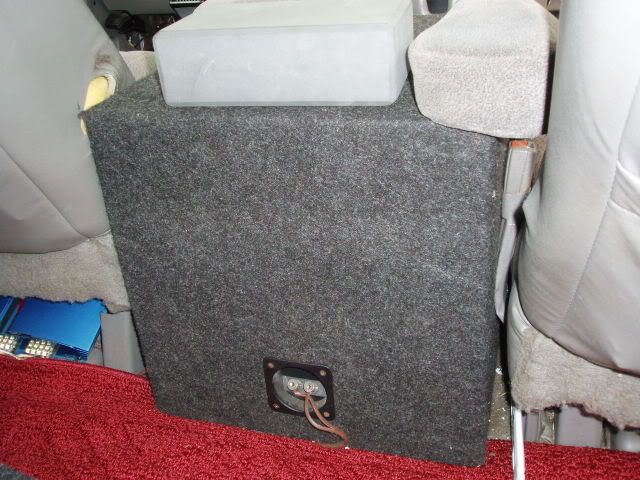
Here is a short write up and pics of the installation of my auxiliary AGM Deep Cycle Marine Battery and isolator switch. Why we didn't document this for the site while we were doing the install is beyond me...
About The Battery:
12V AGM, Group 24, 79Ah, 10.9"L x 6.8"W x 9.9"H, 53lbs
Around $200.00 US

The AGM Deep Cycle battery from West Marine is an "Absorbed Glass Mat" battery.
AGM batteries have several advantages over both gelled and flooded, at about the same cost as gelled:
Since all the electrolyte (acid) is contained in the glass mats, they cannot spill, even if broken. This also means that since they are non-hazardous, the shipping costs are lower. In addition, since there is no liquid to freeze and expand, they are practically immune from freezing damage.
Nearly all AGM batteries are "recombinant" - what that means is that the Oxygen and Hydrogen recombine INSIDE the battery. These use gas phase transfer of oxygen to the negative plates to recombine them back into water while charging and prevent the loss of water through electrolysis. The recombining is typically 99+% efficient, so almost no water is lost.
The charging voltages are the same as for any standard battery - no need for any special adjustments or problems with incompatible chargers or charge controls. And, since the internal resistance is extremely low, there is almost no heating of the battery even under heavy charge and discharge currents. Most AGM batteries have no charge or discharge current limits.
AGM's have a very low self-discharge - from 1% to 3% per month is usual. This means that they can sit in storage for much longer periods without charging than standard batteries.
AGM's do not have any liquid to spill, and even under severe overcharge conditions hydrogen emission is far below the 4% max specified for aircraft and enclosed spaces. The plates in AGM's are tightly packed and rigidly mounted, and will withstand shock and vibration better than any standard battery.
More info here:
http://www.westmarine.com/webapp/wcs/st ... assNum=208
About The Switch:
Around $40.00 US
Make-before-break contact design allows switching between battery banks without power interruption.
Ignition protected - Safe for installation aboard gasoline powered boats
Case design allows surface or rear panel mounting
Meets American Boat and Yacht Council (ABYC) requirements for battery switches
"Blue Sea Systems' switch (9001e) is our choice for best value in a standard-duty battery selector switch. It's made in the U.S. with high grade materials, comes with a lifetime warranty, and is the least expensive switch in our test." - Powerboats Reports, June 2005


More Info here:
http://bluesea.com/category/1/products/9001e
Connecting The Switch
1st thing we did was disconnect both the positive (+) and negative (-) post from the vans battery.
Using the existing positive cable, we removed the protective rubber boot and connected this to the "common" terminal on the switch. [see back of switch]
Next we took a standard 6 inch side post battery cable (purchased from Advanced Auto for about $6.00) and connected this to the "1" terminal on the switch using a ring/crimp connector on the end of the side post cable. Then we connected the side post cable to the (+) Positive terminal on the stock battery.
Next we used a ring/crimp connector and connected the auxiliary battery cable to the "2" connector of the switch. [see back of switch]
We used tie wraps and secured the switch to the existing conduit. It is very secure, and very easy to remove if you need to.



The battery currently is placed behind the 1st row rear seat.
I bought a top post battery cable, 24", and used the seat belt mounting bolt for the ground. [see pic below]



We ran a 6 gauge cable through the firewall close to the steering column.
The cable is from a 16 foot jumper cable that we split and removed the clamps.

When we were finished, I flipped the switch to "2" and started the van using the Aux Battery. Not what I would usually do, just wanted to test it. Switched it back and fourth a few times and everything seems fine. Let it run a while, turned off the ignition, flipped the switch to both "1" and "2" and she fired right up.
I have only been on one road trip so far and the battery has powered my stereo for 8 hours at a time with no issues. To save power I disconnect two of the three amplifiers and run my external speakers.


I use the switch set on "1" + "2", [both batteries in parralel] full time. This way the battery is being charged as needed using the vehicles charging system.
I switch to battery "2" [Aux battery]for when I am running the stereo with the engine off.
The next morning, or after an evening of partying, I turn the switch to "1" [car battery] for starting the engine. After a minute or two, with the engine running, I turn the switch back to "1" + "2" and let the battery recharge.
Of all the deep cycle batteries out there it appears the AGM is best suited for my needs. It can be used inside the vhicle. It can be used as a starting battery and a deep cycle battery and the vehicles charging system will work OK. However, if you run this battery down stone dead, an external charger is recommended to save your alternator.
I hooked up my 3 amplifiers directly to the Aux Battery. The CD player is hooked up normally. As most of you guys may know, a battery is like a big ass capacitor, and hooking an amplifier directly to the Aux battery is an ideal set up. I have a 15" subwoofer between the seats, and this new setup really provides the power when it's needed.

I don't yet have the battery fused. Haven't quite figured out what I should use. Any suggestions?
Here's a couple of pics of the stereo and sub.
The armrests had to come off to squeeze the sub enclosure between the seats.
It is actually more comfortable setting the armrests on the sub.


